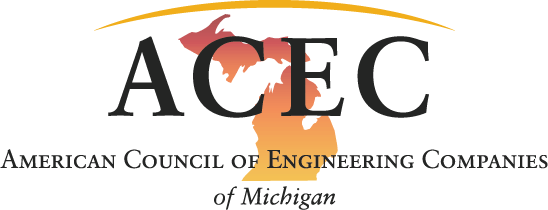Michigan Budget & Legislative Update

Michigan Budget & Legislative Update
Key Impacts on Engineering & Infrastructure
Governor Whitmer’s FY 2026 Budget Proposal
Governor Gretchen Whitmer has introduced an $83.5 billion budget recommendation for FY 2026, emphasizing infrastructure, workforce development, and economic growth.
Budget Overview
- Total Budget: $83.5 billion
- General Fund: $15.3 billion
- School Aid Fund: $21.2 billion
- Federal Funds: $34.8 billion (41.7% of total budget)
Key Budget Priorities
- Lowering Costs
- Creating Jobs
- Investing in Education
- Supporting Seniors
- Enhancing Public Safety
- Improving Government Efficiency
Major Infrastructure & Transportation Investments
- $4.9 billion for road funding (federal, state, and restricted funds)
- $112.2 million to secure Michigan’s full $1.8 billion in federal highway aid
- $98.9 million in new funding for state and local roads, highways, and bridges
- $767 million for transit and rail programs
- $7.8 million for a road usage charge study and pilot program
- $10 million for expanding statewide EV charging stations
- Primary revenue sources: Fuel taxes and vehicle registration fees
Water & Environmental Infrastructure
- $80 millionfor clean drinking water projects, including:
- Lead service line replacements
- Stormwater management systems
- Water infrastructure upgrades
Housing & Workforce Development
- $25 million for employer-assisted housing programs
- $3 million for rural development grants
- $10 million for initiatives aimed at growing Michigan’s population
- Over $100 millionfor workforce growth programs, including:
- $19 million for apprenticeship expansion
- $40.4 million for pre-employment transition support for students with disabilities
- $7.5 million for transportation and childcare assistance for low-income workers
Technology & Disaster Relief
- $20 million to modernize the Unemployment Insurance Agency IT system
- $43.6 million in federal disaster recovery and storm mitigation funds
- $35.8 million for utility infrastructure apprenticeships and energy efficiency programs
- $22.7 million in federal funds for automotive supplier retooling grants
Governor Whitmer’s $3 Billion MI Road Ahead Plan
Alongside the budget, Governor Whitmer has proposed the $3 billion MI Road Ahead Plan, a long-term strategy to address Michigan’s infrastructure challenges with sustainable revenue sources for state and local road funding.
Key Components of the Proposal
- Redirecting Fuel Taxes to Roads ($1.2B)
- The 6% sales tax on fuel would be removed and replaced with an equivalent fuel tax increase to ensure all taxes paid at the pump go directly to road funding.
- $1 billion backfill would compensate schools and local governments that rely on fuel tax revenue.
- New Wholesale Marijuana Tax ($470M)
- A new wholesale tax on marijuana, similar to the existing tobacco tax, would generate an estimated $470 million for road improvements.
- Michigan’s marijuana tax rates are among the lowest in the country, prompting arguments for increased contributions from the industry.
- $500 Million in Budget Cuts
- The plan includes $500 million in state budget reductions, though specific cuts have yet to be identified.
- New Taxes and Fees ($1.6B)
- A combination of corporate tax hikes and new fees, including:
- A possible increase in the 6% Corporate Income Tax (CIT)
- A new digital advertising tax targeting companies like Amazon, Facebook, X (formerly Twitter), and TikTok
- Higher fees for heavy trucks, potentially introducing a weight-distance fee expected to raise over $100 million annually
- A combination of corporate tax hikes and new fees, including:
- Public Transit Investment ($250M)
- An additional $250 million for transit projects, with funding sources yet to be finalized.
Impact on ACEC/Michigan Members
- Sustainable Infrastructure Funding: The MI Road Ahead Plan could provide long-term stability for state and local projects, ensuring steady opportunities for engineering firms.
- Legislative Debate: The proposal seeks bipartisan support by balancing fuel tax reforms with corporate and marijuana tax increases.
- Speaker Matt Hall (R-Richland Township) supports redirecting fuel taxes but prefers using existing funds rather than imposing new taxes.
Legislative Update – Key Engineering & Business Developments
House Committee Assignments & Legislative Priorities
- House Transportation & Infrastructure Committee (Chaired by Rep. Pat Outman) will focus on road funding and transit investments.
- House Regulatory Reform Committee (Chaired by Rep. Joseph Aragona) will address business regulations, construction permitting, and environmental policies.
Major Legislative Proposals & Actions
- Minimum Wage & Earned Sick Time Act (ESTA) Revisions
- HB 4001 & HB 4002 passed with bipartisan support.
- The Senate is reviewing companion bills with a February 21 implementation deadline.
- Senate Democrats seek to keep small businesses (under 50 employees) subject to paid sick leave requirements, though negotiations are ongoing.
- Speaker Matt Hall’s Alternative $3 Billion Road Funding Plan
- A competing proposal reallocates existing state fundsrather than increasing taxes:
- $500 million from eliminating outdated MEGA tax credits
- $500 million from restricting legislative earmarks
- $600 million from surplus general funds
- $500 million from discontinuing automatic SOAR Fund deposits
- $945 million by dedicating all fuel taxes to road funding
- A competing proposal reallocates existing state fundsrather than increasing taxes:
AESLC Legislative Meet & Greet Recap & Upcoming Events
- January 23 Event: AESLC hosted a Legislative Meet & Greet with Reps. Julie Brixie and Angela Witwer at Colliers Engineering, discussing engineering policy collaboration.
Upcoming Events
- February 24 – AESLC Legislative Meet & Greet (Bloomfield Hills)
- February 26 – Governor’s State of the State Address
- March 10 – AESLC Legislative Meet & Greet (Grand Rapids)
Final Takeaways & Next Steps
- Legislative Budget Process: The Governor’s budget serves as a starting point—House and Senate versions will be developed over the next few months.
- May Consensus Revenue Estimating Conference: This will influence final budget negotiations.
- Final Budget Deadline: September 30, though divided government may cause delays.
- Key Issue to Watch: The Governor’s transportation funding proposal vs. competing legislative plans.
Stay Engaged
We will continue to monitor these developments and advocate for Michigan’s engineering and business communities.




